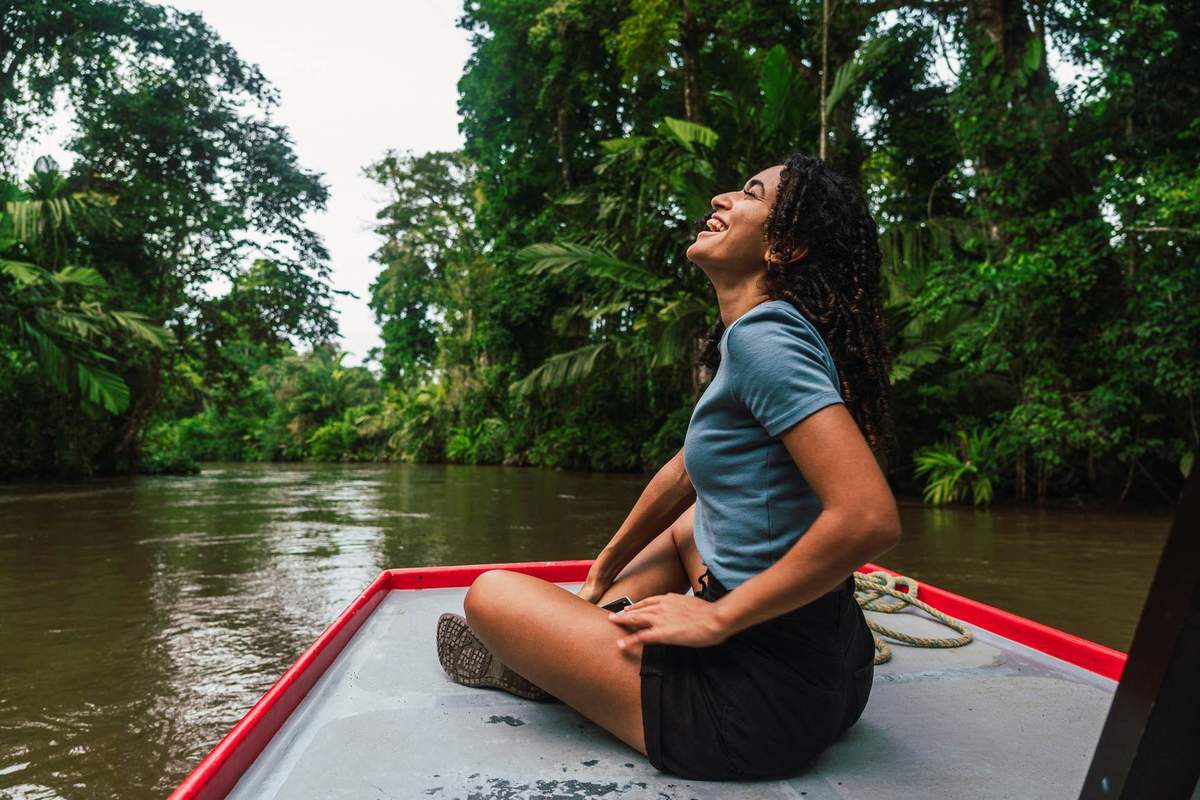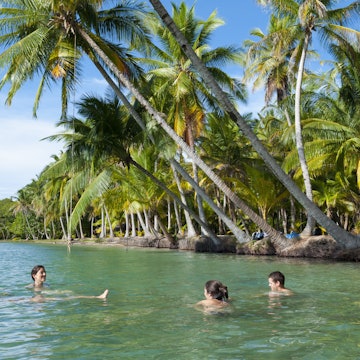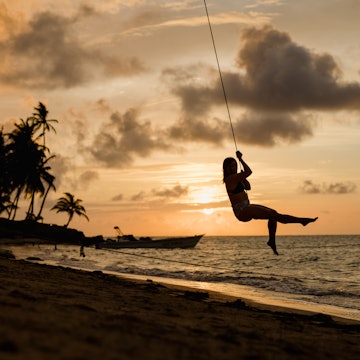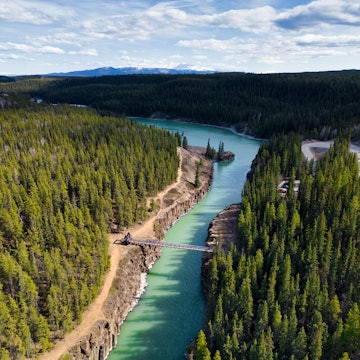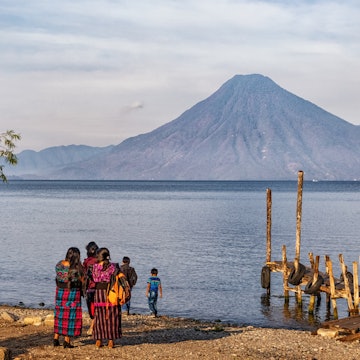

Got car keys? Then start your adventures in Panama City © Cavan-Images / Shutterstock
Few destinations can boast a variety of outstanding geographical diversity as Panama.
Driving here is less about cruising through wide-open spaces and more about taking winding roads to hidden, jungle-shrouded enclaves. On an isthmus otherwise poorly served by public transport, having your own car means easy (or at least easier) access to a slew of memorable sites.
With your own wheels, it's possible to have breakfast by the Pacific Ocean and lunch by the Caribbean Sea. Or you can spend your morning lolling on sugar-white beaches and your afternoon scaling rugged mountain peaks.
Equally, you can experience the urban bustle of the capital and the teeming wilds of the rainforest all on the same day. The opportunity for adventure is endless.
These are the six best road trips in Panama – just to get you started.

1. Go west along the Pan-American Highway
Best road trip to see Panama’s interior
Panama City to David; 448 km (278 miles)
Running east-west through Panama’s Pacific lowlands, the Panamericana (or Pan-American Highway) is the nation’s principal transport artery – a 500-km-long (310 miles) much-used paved road connecting the capital with el interior and, eventually, the international border with Costa Rica.
Most travelers tackle the route in a single bound with a non-stop bus from Panama City to David (7-9 hours), but doing this means missing out on Panama’s central provinces. Take two weeks instead.
West of the capital, the Panamericana skirts a string of low-key beach towns with scorching salt-and-pepper sands. They start with Punta Chame (not to be confused with the village of Chame), a windswept headland with superb kitesurfing from December to May.
Continuing west, you’ll pass the high-rise condos and manicured golf course of Playa Coronado before hitting the surf towns of El Palmar and Rio Mar, the fishing village of Santa Clara and the hamlet of Farallón.
From here, it’s worth taking a one to three-day detour north to El Valle, a refreshing highland spa nestled among brooding peaks.
From Santiago, the capital of Veraguas, you can veer north into the mountains and spend a few days exploring the arresting walking country around Santa Fe.
Or you can take an older, poorly maintained highway southwest, where a turn just before Soná leads to Santa Catalina, a legendary surf town pounded by Hawaiian-style waves. From there, it’s just a short boat ride to Coiba Island and its world-class marine park.
West of Soná, the old highway re-joins the Panamericana at the checkpoint of Guabalá in the Chiriquí Province. The scenery shifts to darker and greener tones as the highway skirts the rugged foothills of Cordillera Central.
To the north, the Comarca Ngäbe-Buglé is a semi-autonomous Indigenous territory offering hikes and cultural exchanges from the community of Soloy.
To the south, the fishing village of Boca Chica is the gateway to tranquil Pacific islands. The ocean is rich in marine life, including humpback whales (Sep-Nov). At the end of your journey, David is Panama’s second city and the perfect post for your next big adventure.
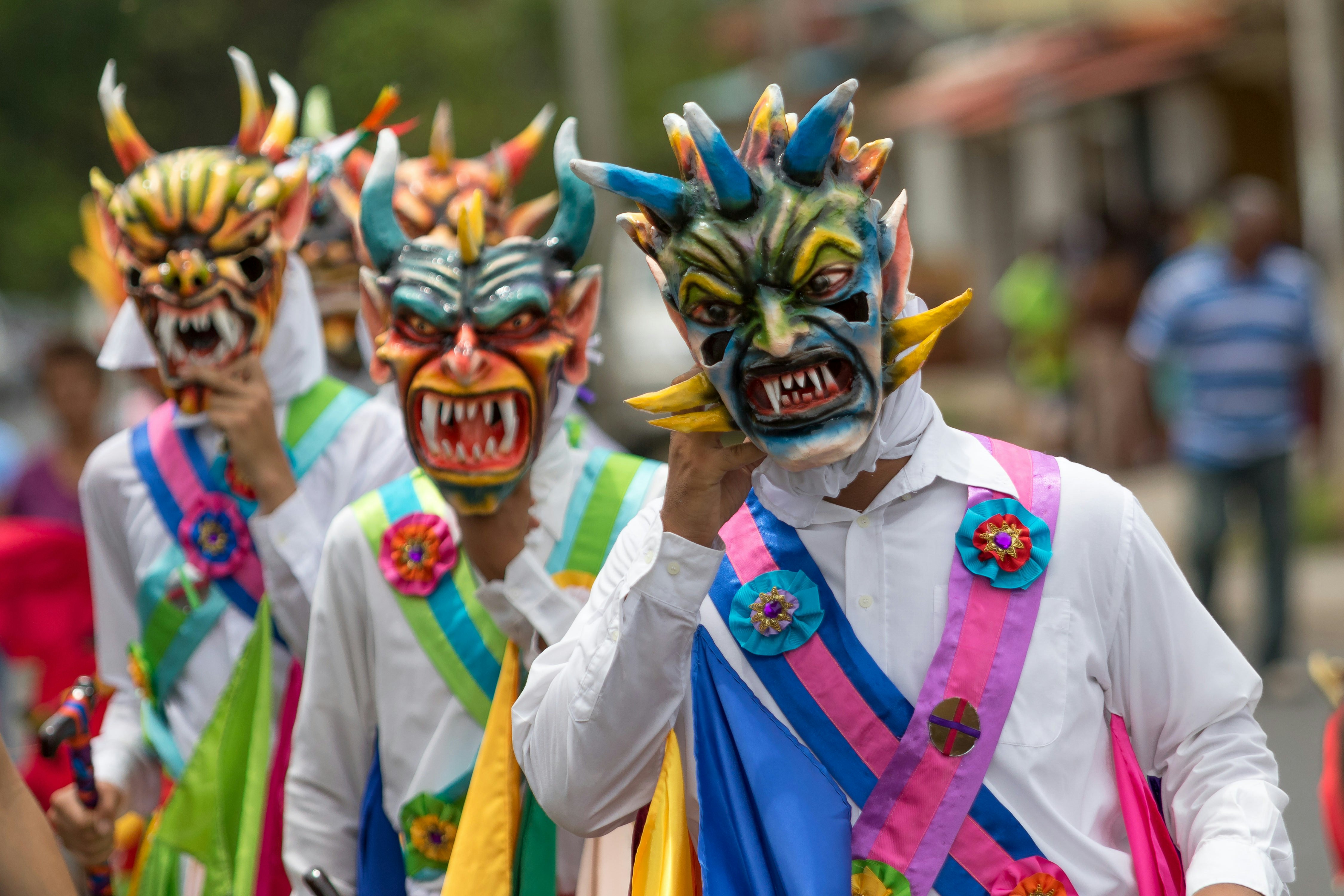
2. The Azuero loop
Best road trip for culture lovers
Divisa-Chitré-Pedasí-Tonosí-Chitré; 309 km (192 miles)
Full of music and pageantry, the Azuero Peninsula is the nation’s fabled cradle of folklore. Sombrero pintados (painted hats), flower-festooned ox carts, fierce masks and intricately embroidered pollera dresses are all symbols of the distinctive local culture known as típico.
Exploring Azuero’s mosaic of lost-in-time villages is easy thanks to its dense road network and relatively flat terrain. Most will complete this road trip in anything from two days to a week. The only non-flat exception is the rugged west coast of Veraguas, which can only be accessed from a turnoff just east of Santiago.
From Divisa on the Panamericana, Highway 2 connects with the village of Parita, where the diminutive church of Santo Domingo de Guzmán boasts lavish Churrigueresque altars and a bell tower laden with mother-of-pearl. Parita is also home to the master mask maker Dario López – look for his delirious creations on display outside his house.
Nearly 40 minutes south is the town of Guararé, which hosts the Feria de La Mejorana – a memorable folkloric festival every September. There’s dancing, elaborate traditional costumes and competitions. The festival attracts visitors from all over the country.
In the southeast of the peninsula, the sleepy town of Pedasí with several beaches including Playa Venao – a world-class surfing hotspot with long, consistent barrels breaking over a perfect, horseshoe-shaped bay.
Around 48 km (30 miles) west of Pedasí, Highway 2 passes through the cowboy town of Tonosí before petering out at the black sand beach of Guánico. From Tonosí, a series of highways loop north to Macaracas and back to Chitré.
3. Mountains and islands
Best scenic road trip
David-Almirante; 164 km (102) miles
The Caribbean coast of Bocas del Toro plays host to sultry rainforests and verdant offshore isles, some of Panama's best. Most travelers end up here sooner or later. This 4-6 hour drive from the Pacific begins around nine miles (14 km) east of David in the Chiriquí Province.
Highway 21 climbs north from the Panamericana and joins Highway 10 in Gualaca. As you wind through bucolic farmlands, the terrain opens up to supply views of the Pacific Ocean below.
As you approach the continental divide, the air becomes noticeably cooler. Barren rocks and a shroud of fog give this stretch a dark and desolate feel.
Before commencing your winding descent into the humid Caribbean watershed, you will cross a dam and reservoir at the Fortuna Hydroelectric Plant – a favorite stop for photos. Once you reach the Banana Coast, you can pause for refreshments at the decaying port of Chiriquí Grande.
Eventually you’ll arrive at the town of Almirante, the launch pad for the Bocas del Toro Archipelago. You can take your car on the ferry, but considering the lack of roads on the islands, it may be better to leave it in a guarded lot near the port.

4. The former Panama Canal Zone
Best road trip for seeing the canal
Balboa-Miraflores Locks-Centenario Bridge-Gatún; 83 km (52 miles)
Established by the United States in 1903 for the purposes of constructing and administering the canal, the Panama Canal Zone was an 8km-wide (5-mile) strip of unincorporated territory running from ocean to ocean.
It was a de facto state within a state until its dissolution in 1979. The former canal zone can be explored in one long day trip from the capital. Starting in Panama City, the township of Balboa retains its working port and much of the civic and administrative architecture from the early 20th century.
Heading north, Avenida Omar Torrijos Herrera skirts the canal’s eastern flank, passing the Pedro Miguel and Miraflores Locks. The latter has an excellent visitors center and viewing platform.
At the sleepy township of Paraiso, you will pass the Centenario Bridge and the Culebra Cut – a daunting manmade channel painstakingly carved through the continental divide.
A mile or so north of Paraíso, the Madden Highway branches east through the jungle and eventually connects with the northbound Transistmica Highway. Outside of its vast and heavily fortified free trade zone, Colón is the Caribbean terminus of the canal, but it’s best avoided altogether.
When you reach its outskirts, turn southwest toward the vast locks at Gatún. Nearby, the Agua Clara locks were constructed in 2016 to accommodate so-called Neo-Panamax vessels. It has a new visitors center and restaurant.
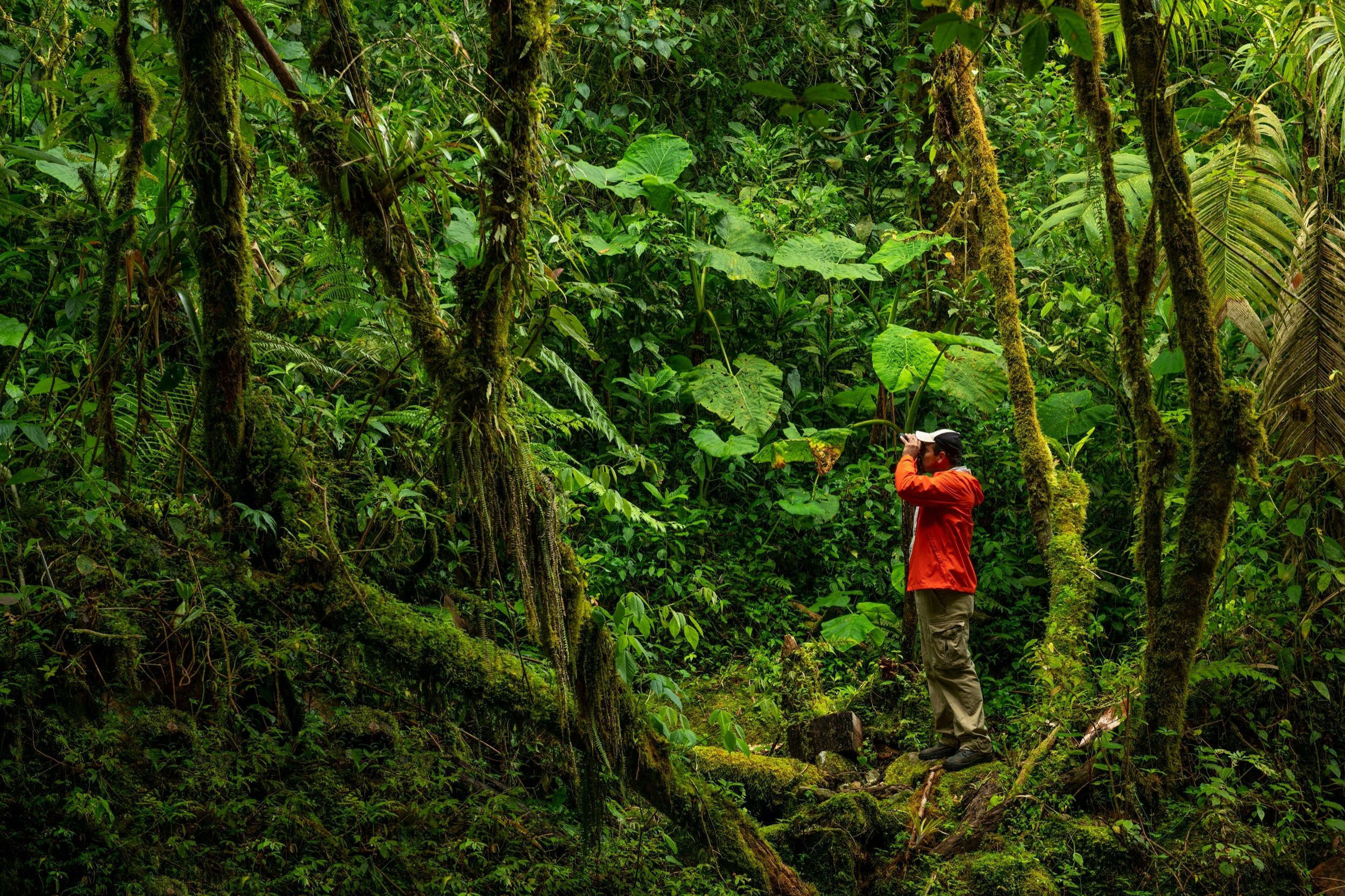
5. A ride through Panama's rivers and rainforests
Best road trip for wildlife-spotting
Panama City-Gamboa; 32 km (20 miles)
The protected rainforests just outside of Panama City drain the vast quantities of water necessary for the day-to-day functioning of the Panama Canal. They also form a scintillating biological corridor that encompasses both the Pacific and Caribbean zones.
Around 1.6 km (1 mile) north from the former canal zone, a side-road leads to the Canopy Tower, a jungle-shrouded birders’ lodge set in an old U.S. Air Force radar tower. Next door is the entrance to the Plantation Trail, 13 km (8 miles) round-trip route featuring remnants of coffee, rubber and other commercial tree stands.
The Plantation Trail eventually connects with the Camino de Cruces Trail, a 16th-century transisthmian supply route, but continue north on Omar Torrijos and you’ll eventually cross the Chagres River at the old dredging port of Gamboa.
From here, you can take a boat to Barro Colorado, an ecological station managed by the Smithsonian Tropical Research Institute (advance bookings only).
Alternatively, you can travel about 15 minutes north from the Canopy Tower to the Pipeline Trail, a world-class birding trail where 385 avian species were famously spotted during a 24-hour count in 1985. The whole trip is doable in a day, but give yourself three.

6. Pirates of the Caribbean
Best road trip for history buffs
Cólon-San Lorenzo-Portobelo-Nombre de Dios; 123 km (76 miles); 1-3 days
Panama’s lesser-visited Central Caribbean Coast has exceptional ruins that tell the tales of the exploits of pirates and privateers. This trip is possible in a day, but take three to do it justice. West of Colón, a road heads north through Fort Sherman (now a marina) and connects with the fortress of San Lorenzo. With a commanding clifftop setting, Lorenzo endured historic attacks by Sir Francis Drake and Henry Morgan.
The shoreline west is known as the Costa Abajo. To access its remote Afro-Panamanian fishing communities, you will need to loop back around to Lake Gatún before heading south and rejoining the coast via Achiote.
Offshore, Isla Grande is a favorite haunt of Panama City weekenders but empty during the week. Continuing east on the Costa Arriba highway, you will pass the historic site of Nombre de Dios, founded by early Spanish colonizers in 1509.
This was the terminus of the Camino Real, the first transisthmian mule trail established by Spanish colonizers. The Costa Arriba road passes the villages of Viento Frío, Palenque and Miramar before petering out in Cuango.
We suggest turning back unless you have a sturdy 4WD capable of going off-road. The route is unpaved from here and is often washed out during the wet season.
Tips for driving in Panama
There are a lot of things worth knowing before traveling to Panama, but you should know that driving in Panama City should be avoided when possible – use metro trains and buses instead. Outside of the capital, drivers are generally courteous, but these tips for driving in Panama should put you on the right path for a successful road trip or two.
You will need a 4WD to get around.
Overtaking on highways is normal.
All major roads are in reasonable repair. Minor roads are frequently potholed and sometimes unpaved.
Flash floods and landslides are common in the wet season.
Expect police stops and immigration checks on the Panamericana.
Protests sometimes cause traffic on the highway to grind to a halt for several hours.






